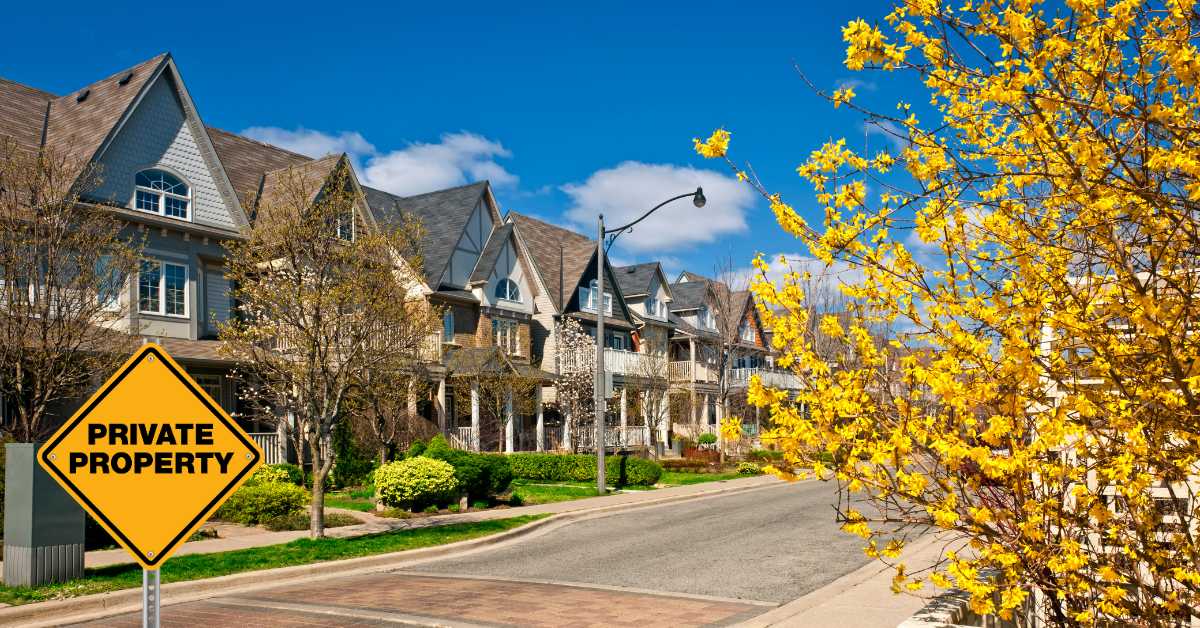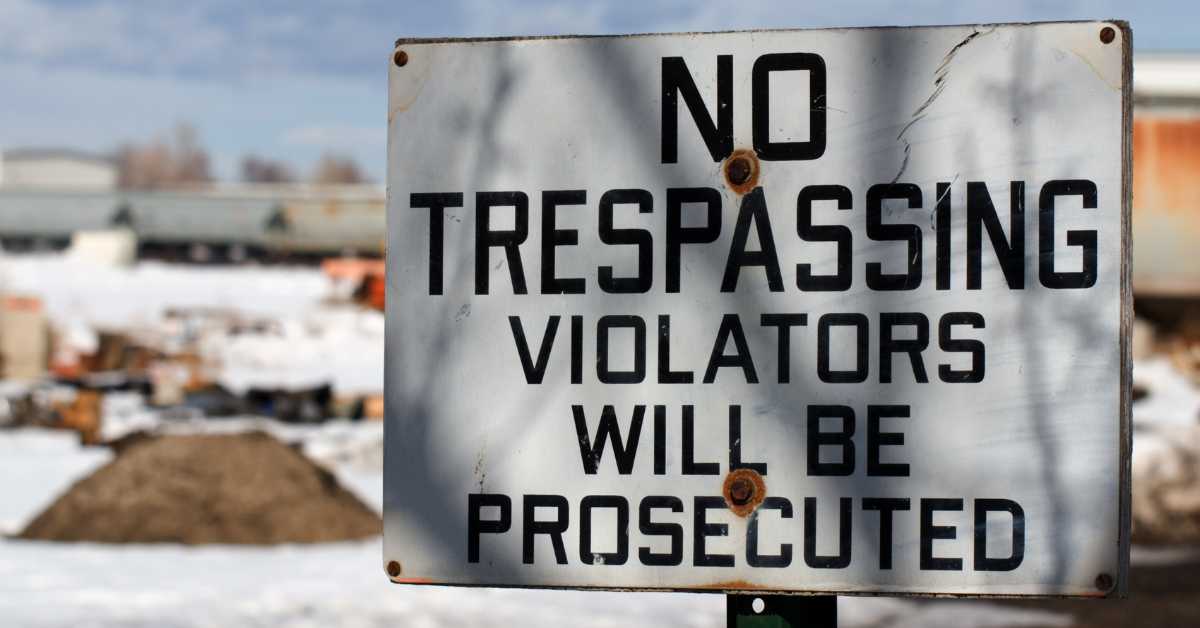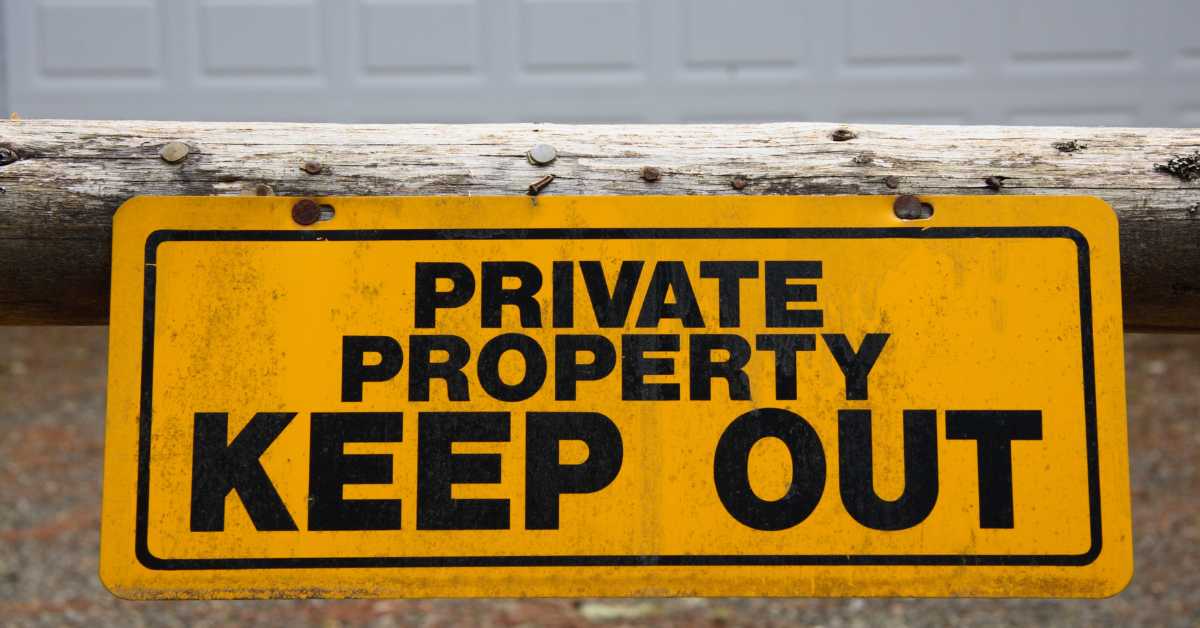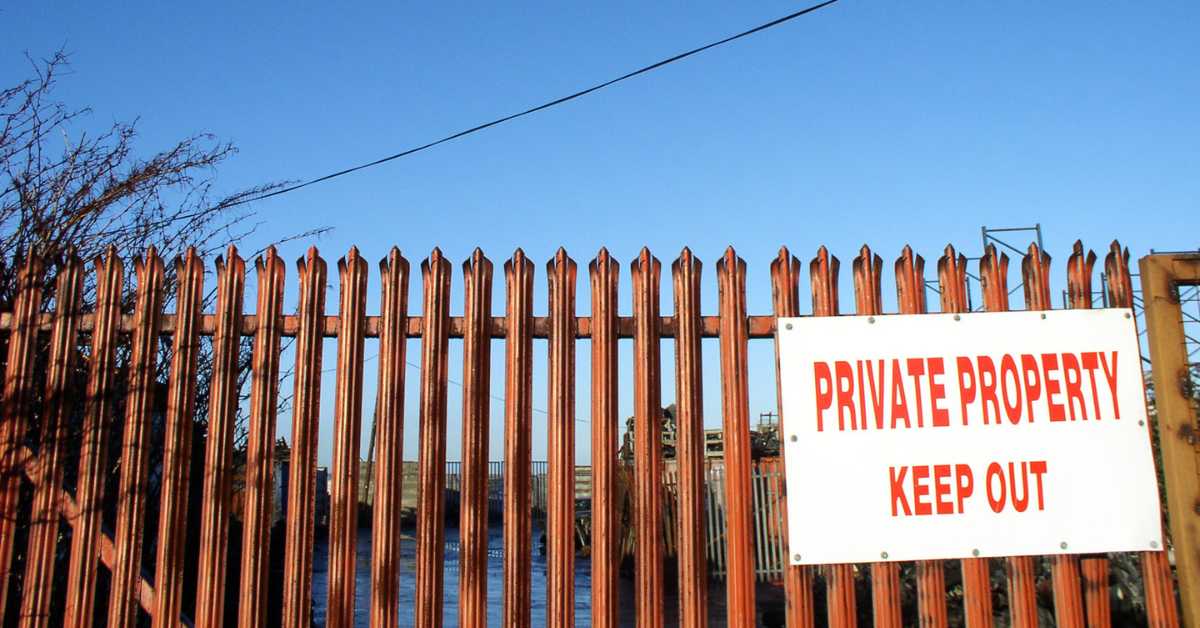This article aims to explore the various ‘polite ways to say do not enter.’
Respecting private property and maintaining boundaries are essential aspects of a harmonious society. In order to foster a sense of belonging and promote mutual understanding, it is crucial to communicate such restrictions in a courteous and considerate manner.
By using language that is respectful and inclusive, individuals can effectively convey their need for privacy or limited access without causing offense or discomfort.
This article will provide an overview of several phrases commonly used to politely discourage entry into restricted areas while promoting a culture of shared responsibility and adherence to rules.
Understanding these polite expressions will enable individuals to navigate private spaces with discretion, showing respect for others’ rights and maintaining positive relationships within our communities.
Polite Ways To Say Do Not Enter: We kindly request that you refrain from entering this area. Your cooperation is greatly appreciated in maintaining safety and order in this space.
Please Respect Private Property

Respecting private property is of utmost importance and should be upheld by individuals at all times. It serves as a fundamental principle in maintaining social order and ensuring the rights and privileges of property owners.
By adhering to this principle, individuals demonstrate their commitment to fostering a sense of belonging within the community.
One way to convey the message of ‘do not enter’ in a polite manner is by using the phrase ‘Please Respect Private Property.’ This concise statement effectively communicates the need for individuals to refrain from entering or trespassing onto someone else’s land or premises without permission.
The use of the word ‘please’ adds a polite tone, appealing to individuals’ sense of courtesy and consideration towards others.
Highlighting the importance of respecting private property underscores the significance that society places on individual ownership rights. It acknowledges that every person has the right to control access to their own property.
By refraining from unauthorized entry, individuals contribute to creating an environment where personal boundaries are respected, fostering trust and harmony among community members.
Urging others to respect private property through phrases such as ‘Please Respect Private Property’ emphasizes the value placed on personal ownership rights while promoting a sense of inclusivity within society.
By upholding this principle, individuals reinforce social norms that foster belongingness and encourage harmonious coexistence between neighbors and community members.
Restricted Access: Authorized Personnel Only”
Regarding the area under consideration, entry is exclusively permitted for authorized personnel. This restriction is in place to ensure the safety and security of individuals and property within the premises.
By limiting access to only those who have been granted authorization, the management aims to maintain a controlled environment that fosters a sense of belonging among its rightful occupants.
The phrase ‘Restricted Access: Authorized Personnel Only’ serves as a polite reminder that unauthorized individuals should refrain from entering the area.
It conveys a message of exclusivity and highlights the importance of respecting boundaries. The use of such language not only sets clear expectations but also creates an atmosphere where individuals feel valued and protected.
In environments where restricted access is necessary, it is crucial to communicate this requirement politely. By emphasizing the need for authorization, individuals are reminded that their safety is being prioritized while simultaneously encouraging them to seek permission if they believe they have a legitimate reason for entrance.
This approach promotes mutual respect between visitors and those responsible for maintaining order within the area.
Overall, by using language appropriate for an audience that desires to belong, the phrase ‘Restricted Access: Authorized Personnel Only’ effectively communicates the need to limit entry in a polite manner while fostering inclusivity among authorized personnel.
No Trespassing: Violators Will Be Prosecuted

Enforcement measures will be taken against individuals who trespass on the premises, as indicated by the signage displaying ‘No Trespassing: Violators Will Be Prosecuted.’
This statement serves as a clear warning to potential intruders that unauthorized entry is strictly prohibited and legal action will be pursued.
The use of this phrase aims to deter individuals from entering restricted areas, emphasizing the seriousness of the consequences they may face.
The purpose behind such language is to establish a sense of order and security within the premises. By clearly communicating the consequences of trespassing, this signage seeks to protect both property and people. It serves as a reminder that certain areas are off-limits and accessible only to authorized personnel.
Additionally, utilizing polite yet firm language in this context demonstrates respect for those who comply with the rules and regulations in place. It acknowledges their role as responsible members of the community who understand and respect boundaries.
This approach fosters a sense of belonging among law-abiding individuals, creating an environment where everyone feels safe and valued.
Displaying signs stating ‘No Trespassing: Violators Will Be Prosecuted’ conveys a strong message regarding unauthorized access while maintaining an inclusive atmosphere for those who adhere to established guidelines.
These signs reflect an intention to maintain order, protect property, and cultivate a sense of belonging among authorized individuals within the premises.
For Authorized Personnel Only
Restricting access to designated areas through the use of signage stating ‘For Authorized Personnel Only’ establishes a clear boundary between those with permission to enter and those without, emphasizing the importance of adhering to established guidelines for the safety and security of all individuals within the premises.
This polite way of indicating restricted access serves as a reminder that certain spaces are intended exclusively for authorized individuals who possess specific credentials or clearance.
By prominently displaying such signs, organizations convey a sense of exclusivity and control over their premises, creating an environment where only approved personnel are allowed entry.
This practice not only enhances security measures by preventing unauthorized individuals from entering sensitive areas but also fosters a sense of belonging among authorized personnel.
By clearly delineating boundaries, these signs communicate that certain spaces are reserved for select individuals who have undergone proper authorization processes.
Moreover, utilizing language appropriate for an audience that desires belonging ensures that everyone feels included within their respective roles and responsibilities.
The phrase ‘For Authorized Personnel Only’ avoids any confrontational or negative connotations commonly associated with phrases like ‘No Trespassing.’ Instead, it promotes a more positive atmosphere by focusing on granting access rather than denying entry.
Employing signage stating ‘For Authorized Personnel Only’ respectfully communicates restricted access while maintaining an inclusive tone. It reinforces the significance of following established guidelines for the welfare and protection of all individuals present in the designated areas.
Please Keep Out

The signage stating ‘Please Keep Out’ serves as a clear and assertive means of delineating boundaries, effectively conveying that entry into the designated areas is prohibited without explicitly resorting to confrontational language.
This phrase, commonly used in various contexts such as construction sites, private properties, or restricted areas, politely communicates the need for individuals to refrain from entering certain spaces.
By using the word ‘please,’ it imparts a sense of politeness and consideration while maintaining firmness in its message.
This choice of wording is particularly suitable for an audience that desires to belong since it acknowledges their presence and potential desire to explore but firmly establishes the limits within which they must abide.
It fosters a sense of mutual respect between those granted access and those who are not, promoting a harmonious coexistence within shared spaces.
Furthermore, the phrase ‘keep out’ implies personal responsibility on behalf of the reader. It recognizes their ability to make informed decisions by respecting boundaries set by others.
In this way, it appeals to their sense of self-worth and autonomy while still emphasizing the importance of adhering to rules and regulations established for safety or security purposes.
The use of ‘Please Keep Out’ signage strikes a balance between cordiality and assertiveness when delineating boundaries. Its polite yet firm language conveys respect for individuals’ desires while effectively communicating that entry into restricted areas is prohibited.
Area Closed to the Public
Prohibiting public access, the signage indicating an area closed to the public effectively establishes a clear demarcation between authorized and unauthorized entry without resorting to confrontational language.
Such signage plays a crucial role in maintaining order and security in various settings, such as private properties, construction sites, or restricted government areas.
By using the phrase ‘Area Closed to the Public,’ this polite alternative communicates the restriction clearly while avoiding any tone of hostility or aggression. This language choice is particularly suitable for an audience that values inclusivity and desires a sense of belonging within their community.
The purpose of indicating an area closed to the public is not only to prevent unauthorized individuals from entering but also to ensure safety and protect valuable assets.
It serves as a reminder that certain places require specific permissions or qualifications for entry, thereby preserving privacy and safeguarding against potential harm.
Moreover, employing this non-confrontational approach encourages individuals who may have unintentionally wandered into these areas to respect boundaries without feeling personally attacked or accused.
This creates a more harmonious environment where people can coexist while adhering to established rules and regulations.
Utilizing signage stating ‘Area Closed to the Public’ achieves its objective by effectively communicating restrictions on unauthorized entry with politeness and consideration towards those who encounter it.
Such language choices contribute positively towards fostering a sense of belonging within communities that value inclusivity while maintaining necessary boundaries for safety and security purposes.
Access is Limited to Authorized Individuals

The previous subtopic discussed an area that is closed to the public, emphasizing the restriction of access for individuals.
Building upon this notion, we now shift our attention to another aspect related to limited access specifically, access limited to authorized individuals.
In certain environments or establishments, it becomes necessary to restrict entry solely to those who possess the necessary authorization. This measure ensures security, safety, and confidentiality within the designated area.
By limiting access exclusively to authorized individuals, organizations can effectively control and monitor who enters their premises.
Implementing such restrictions fosters a sense of inclusivity and belonging among those granted permission. Authorized personnel are provided with a unique opportunity to engage in activities or gain knowledge that may not be accessible elsewhere.
They become part of a select group entrusted with specific privileges and responsibilities.
It is important for both the organization and authorized individuals themselves to uphold these restrictions diligently. Adhering strictly to established protocols helps maintain orderliness while safeguarding sensitive information or valuable resources.
Additionally, it cultivates a culture of respect for boundaries and reinforces the significance of authorization in granting entry.
Overall, by limiting access exclusively to authorized individuals, organizations foster an environment where belonging is nurtured through shared privileges and responsibilities while simultaneously ensuring security and confidentiality are upheld at all times.
Do Not Enter Restricted Area
Restricted areas are designated spaces that are off-limits to unauthorized individuals, ensuring the maintenance of security and confidentiality. These areas often contain sensitive information or valuable assets that need protection from potential threats or risks.
The purpose of marking these areas with ‘Do Not Enter: Restricted Area’ signs is to clearly communicate to all individuals that access is restricted and only authorized personnel are allowed entry.
By using polite language to convey this message, it helps create a sense of belonging for those who have proper authorization. It acknowledges their role in maintaining security while also emphasizing the importance of respecting boundaries for everyone’s benefit.
Additionally, employing respectful language fosters a culture of professionalism and mutual respect among individuals within the organization or facility.
The use of phrases such as ‘restricted area’ highlights the seriousness and significance of these zones. It serves as a reminder that certain spaces require special permissions due to the nature of their contents or activities taking place within them.
This communicates a sense of exclusivity, which can further enhance the perception of importance surrounding these restricted areas.
Overall, by using language appropriate for an audience seeking to belong, the message conveys both authority and respect while emphasizing the necessity for adherence to access limitations in order to maintain safety and confidentiality within restricted areas.
Please Stay Out: Private Property

Private property is an area that is cordoned off to prevent unauthorized access, serving as a safeguard for the privacy and security of its owners.
It signifies a space where only those with permission are allowed, ensuring a sense of exclusivity and control over one’s own domain.
The phrase ‘Please Stay Out’ acts as a polite way to communicate this restriction, implying that entering without authorization would be considered an intrusion upon the rights and boundaries of the property owner.
This language choice aims to appeal to individuals who value their own personal spaces and understand the importance of respecting others’ boundaries.
By using polite language, such as ‘please,’ it encourages a more considerate approach towards private property, fostering a sense of community where everyone’s rights and possessions are honored.
Furthermore, the use of the term ‘private property’ emphasizes the legal ownership aspect of these areas. It reminds individuals that trespassing on someone else’s land is not only impolite but also against the law.
This helps deter unauthorized entry by appealing to people’s desire to adhere to societal norms and avoid potential legal consequences.
Employing phrases like ‘Please Stay Out’ when referring to private property strikes an appropriate tone for an audience seeking to belong by emphasizing respect for others’ boundaries while adhering to legal principles.
FAQs About Polite Ways To Say Do Not Enter:
Q:1 What are the potential consequences of trespassing in a restricted area?
Trespassing in a restricted area can result in various consequences. These may include legal penalties such as fines, imprisonment, or both, depending on the severity of the trespassing offense. Additionally, individuals may face civil liabilities if their actions cause damage to the property or harm to others.
It is important to respect and adhere to signage or warnings indicating restricted areas to avoid potential legal repercussions and maintain a sense of belonging within the community.
Q:2 Can I enter the area if I have a valid reason, but I am not authorized personnel?
While having a valid reason for entering a restricted area may seem reasonable, it is important to note that being authorized personnel is typically a requirement. Unauthorized entry can have legal consequences due to the potential risks involved and the need to maintain security measures.
It is advisable to respect the rules and procedures in place for accessing such areas, as this ensures both personal safety and adherence to established protocols.
Q:3 Are there any exceptions to the restricted access policy?
Exceptions to the restricted access policy are typically implemented to accommodate individuals with valid reasons for entering an area despite not being authorized personnel. These exceptions are granted on a case-by-case basis, subject to approval from relevant authorities.
It is important to note that such exceptions do not negate the need for proper authorization and adherence to security protocols. By maintaining strict control over access, organizations prioritize safety and security while ensuring that legitimate concerns are addressed within the established guidelines.
Q:4 How can I obtain authorization to enter the restricted area?
Authorization to enter the restricted area can be obtained by following proper procedures.
It is essential to adhere to the established guidelines and obtain permission from the appropriate authorities.
This may involve submitting an application or request, providing necessary documentation, and undergoing any required screenings or background checks.
By demonstrating a genuine need for access and complying with the prescribed protocols, individuals can seek authorization in a manner that aligns with the rules and regulations governing the restricted area.
Q:5 Is there a designated contact person for inquiries regarding access to the restricted area?
For inquiries regarding access to the restricted area, it is advisable to inquire about a designated contact person. This individual can provide information and guidance on how to obtain authorization for entry.
Establishing communication with the appropriate contact person is crucial in order to navigate through the necessary procedures and protocols required for accessing the restricted area.
By reaching out to this designated point of contact, individuals can clarify any doubts or concerns they may have related to obtaining permission for entry.
Conclusion:
The article highlights various polite ways to communicate a ‘do not enter’ message.
Phrases such as ‘Please Respect Private Property,’ ‘Restricted Access: Authorized Personnel Only,’ and ‘No Trespassing: Violators Will Be Prosecuted’ effectively convey the message of restricted entry.
These phrases ensure that individuals understand the boundaries and legal consequences of entering private or restricted areas without permission.
In an academic style, it is important to utilize language that maintains professionalism while effectively communicating the intended message.
We hope you will be well aware of Polite Ways To Say Do Not Enter, after reading this comprehensive article. If you have any questions, feel free to comment below!
